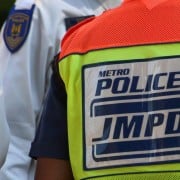|
Getting your Trinity Audio player ready...
|
Releasing its report into bribery in the Johannesburg Metropolitan Police Department (JMPD), Corruption Watch has called on the City of Johannesburg to “get real” and recognise the high extent of traffic cop bribery on the roads. Read the full report here.
The civil society organization is also launching a nationwide “no more tjo-tjo” campaign to encourage the public speak out and refuse to take part in bribery. The campaign is underpinned by the The Law for Sale report, one of several planned by Corruption Watch to highlight the hotspots of corruption in the country.
The Law for Sale report gives voice to road users in Joburg and documents their experiences of corruption during their encounters with the JMPD. It points out that the endemic nature of bribery among junior officials could not happen without the knowledge of higher ranking officials. It criticizes the JMPD for being in denial about the extent of corruption within its force.
JMPD’s statistics on police corruption show that only 184 cases of corruption were reported over the last three years (2009 to 2011). Out of these, 37 officers were found guilty and only 19 were dismissed. The data suggests that very few officers are involved in corrupt behaviour. However, this largely contrasts with the experiences of road users documented in the Law for Sale study and as well as in other surveys which show that one in four road users in Joburg has been asked to pay a bribe.
“We often hear the excuse that the public is responsible for offering bribes to traffic officers. But we look up to law enforcement officers to be accountable and exemplary in their behaviour. The public would be very reluctant to offer a bribe if they knew that traffic officers always upheld the law,” said David Lewis, Corruption Watch executive director.
Corruption Watch recommendations to the JMPD and City of Joburg are:
- Take responsibility for addressing corruption: The magnitude of the problem must be acknowledged and be treated with the seriousness and the urgency it demands.
- Traffic officers should wear visible identification.
- Members of the public and JMPD officers must be able to report corruption with certainty that their identity can be kept confidential. Corruption reporting mechanisms should be widely publicized.
- Field integrity tests should be used for purposes of gathering evidence for disciplinary measures. Sting operations should be regularly used to identify corrupt cops.
- Public campaigns supported by the Mayor and key stakeholders, such as the unions and the taxi associations, must be mounted to remind the public that corruption is a criminal offence.
Corruption Watch has created a “know your rights” pocket size card to alert drivers that bribery is a crime and to inform them of their rights. This was done with the support of Lead SA.
For more information:
Bongi Mlangeni
Head of Communication
Tel: +27 (0)11 447 1472
Fax: +27 (0)11 447 2696
Cell: +27 (0)76 862 9086
Releasing its report into bribery in the Johannesburg Metropolitan Police Department (JMPD), Corruption Watch has called on the City of Johannesburg to “get real” and recognise the high extent of traffic cop bribery on the roads.





